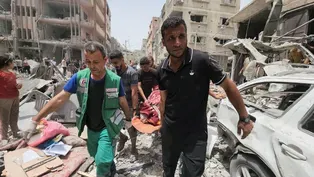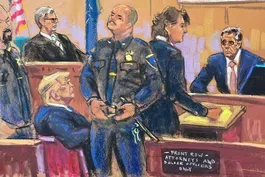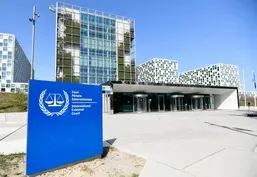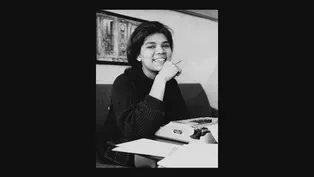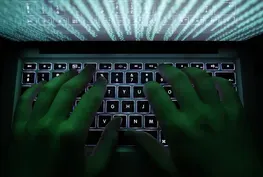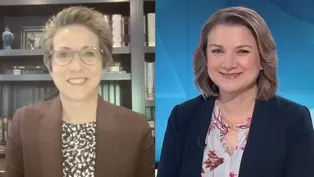
Deaths leave Iran without key leadership at crucial moment
Clip: 5/20/2024 | 9m 15sVideo has Closed Captions
Raisi's death leaves Iran without key leadership at crucial moment for Middle East
The deaths of Iranian President Ebrahim Raisi and the country's foreign minister left the Islamic Republic without two key leaders as extraordinary tensions grip the wider Middle East. The deaths mark yet another blow to a country beset by pressures at home and abroad. Reza Sayah reports from Tehran and Amna Nawaz discusses what this means for Iran’s future with Suzanne Maloney.
Problems with Closed Captions? Closed Captioning Feedback
Problems with Closed Captions? Closed Captioning Feedback
Major corporate funding for the PBS News Hour is provided by BDO, BNSF, Consumer Cellular, American Cruise Lines, and Raymond James. Funding for the PBS NewsHour Weekend is provided by...

Deaths leave Iran without key leadership at crucial moment
Clip: 5/20/2024 | 9m 15sVideo has Closed Captions
The deaths of Iranian President Ebrahim Raisi and the country's foreign minister left the Islamic Republic without two key leaders as extraordinary tensions grip the wider Middle East. The deaths mark yet another blow to a country beset by pressures at home and abroad. Reza Sayah reports from Tehran and Amna Nawaz discusses what this means for Iran’s future with Suzanne Maloney.
Problems with Closed Captions? Closed Captioning Feedback
How to Watch PBS News Hour
PBS News Hour is available to stream on pbs.org and the free PBS App, available on iPhone, Apple TV, Android TV, Android smartphones, Amazon Fire TV, Amazon Fire Tablet, Roku, Samsung Smart TV, and Vizio.
Providing Support for PBS.org
Learn Moreabout PBS online sponsorshipAMNA NAWAZ: Iranian President Ebrahim Raisi and the country's foreign minister were found and confirmed dead today hours after their helicopter crashed in fog, leaving the Islamic Republic without two key leaders as extraordinary tensions grip the wider Middle East.
Supreme Leader Ayatollah Ali Khamenei, who has the final say in the Shiite theocracy, quickly named a little-known vice president as caretaker until the new election and insisted the government was in control.
But the deaths marked yet another blow to a country beset by pressures at home and abroad.
Special correspondent Reza Sayah in Tehran has the latest.
REZA SAYAH: It was a crash felt across the Middle East.
In Iran's mountainous northwest, a dense fog thinned out this morning, revealing the helicopter's mangled tail and shards of debris wedged between the trees.
After an hours-long search, rescue teams found no survivors.
Among the eight people on board, Iran's hard-line President and the supreme leader's protege, Ebrahim Raisi, as well as the country's foreign minister, Hossein Amirabdollahian, two of Iran's most senior figures killed.
MAN (through translator): This is a serious incident for all of us.
REZA SAYAH: A stunning loss that threatens instability.
But, today, the country's newly appointed caretaker, First Vice President Mohammad Mokhber, delivered a message of reassurance.
MOHAMMAD MOKHBER, Interim Iranian President (through translator): The country will continue moving forward under this leadership.
Everyone should continue on with their roles, despite this incident.
In no way will this tragic incident interfere with the government and running of our country.
REZA SAYAH: Raisi was viewed as a regime loyalist, rewarded by Iran's supreme leader with numerous promotions, and finally a presidential candidacy in 2017.
That year, Raisi lost.
Four years later, he won after a carefully choreographed election campaign.
Raisi's government cracked down on internal unrest after the death of Mahsa Amini sparked mass protests in 2022.
Raisi won the 2021 presidential elections with the lowest voter turnout in four decades.
He was clearly not a popular figure.
Even so, many believe his carefully engineered political rise was not going to end at the presidency.
Many believe he was being groomed to replace Iran's aging supreme leader.
With his death, the most important question now may not be who Iran's next president will be, but who Iran's next supreme leader will be.
In Tehran today, hundreds of Raisi supporters gathered in the streets to mourn.
MOHAMMAD BEHESHTI, Tehran Resident (through translator): We were shocked that we lost such a character, a character that made Iran proud and humiliated the enemies.
REZA SAYAH: Outside Iran's borders, a very different sentiment.
In Berlin, Iranians living in exile showed little sorrow.
MOHAMMADREZA SHARAFATI, Iranian Exile (through translator): We are very, very happy.
And we hope that we -- as soon as possible, we will take our country back.
REZA SAYAH: Raisi and his convoy had been flying back from Azerbaijan late Sunday, where, hours before the crash, he met with leaders and visited a dam construction site.
Flying conditions were poor, but officials did not immediately say what caused the Bell helicopter to go down.
U.S. State Department officials blamed Iran for flying the helicopter carrying the president in bad weather.
MATTHEW MILLER, State Department Spokesman: Ultimately, it's the Iranian government that is responsible for the decision to fly a 45-year-old helicopter in what was described as poor weather conditions, not any other actor.
REZA SAYAH: Acting President Mokhber spoke by phone today with leaders of Russia and Turkey, and condolences poured in from countries around the world.
Officials in Lebanon, Syria and Iraq announced a mourning period to span the next three days.
For the "PBS NewsHour," I'm Reza Sayah in Tehran.
AMNA NAWAZ: And to break down what this means for Iran's future and how it impacts foreign policy at this crucial juncture, we turn now to Suzanne Maloney.
She's vice president and director of foreign policy at the Brookings Institution.
That's a Washington, D.C., think tank.
Welcome.
Thanks for being here.
SUZANNE MALONEY, Saban Center for Middle East Policy, Brookings Institution: Thank you.
AMNA NAWAZ: Let's begin with this helicopter crash.
Is there any reason to believe that this was anything other than an accident, that this could have been foul play?
SUZANNE MALONEY: I think the most realistic explanation is one that is the most obvious.
It was very poor weather, based on some of the scenes from the rescue efforts.
This was -- there was fog, rain, and it was a helicopter that was quite old.
It's quite understandable that there are conspiracy theories.
Iranians have a tendency to interpret events in the light of their own history.
And, of course, in particular, the region has been aflame recently.
Iran recently struck Israel in an unprecedented attack.
And the Israeli response was quite mild.
And so, given the past history of Israeli assassinations on Iranian territory of nuclear scientists, I think it's not surprising that there are conspiracy theories within Iranians and around the region.
AMNA NAWAZ: Tell us more about Ebrahim Raisi.
We heard Reza Sayah report there, not a popular man.
But tell us about the role he played in leadership, how he was seen by the public.
SUZANNE MALONEY: Well, his most notable achievement was his role in the deaths of thousands of political prisoners back in 1988 who were sent to their deaths in sham trials over which Raisi and several other judges presided.
That seems to have cemented his rise through the judicial apparatus within Iran, which is typically not a path to power within the executive branch.
And yet Raisi was plucked from the judiciary, clearly being groomed for something greater by the Iran supreme leader.
He had close family connections to Iran's powerful religious establishment in Mashhad and had run Iran's largest religious shrine there.
And many considered him to be the most leading candidate for succession.
The supreme leader in Iran, who holds ultimate authority, is 85 years old and is expected to pass from the scene in coming years.
AMNA NAWAZ: And Raisi was a protege of Khomeini.
As you mentioned, he is 85 years old.
Succession talk is ramping up.
Is there a clear successor to Khamenei in Raisi's absence?
SUZANNE MALONEY: Well, the only other well-known candidate is actually Mojtaba Khamenei, who is the son of the current supreme leader and who is quite influential behind the scenes, but has never held a leadership role and has somewhat dubious clerical credentials.
And so, given that this is a system has inveighed against hereditary monarchy for the past 45 years, it would be quite controversial if Mojtaba becomes the only figure who is in contention to succeed his own father.
AMNA NAWAZ: This is a jarring moment for a nation to lose two leaders like this so suddenly at a time of enormous upheaval in the region, especially as we see Iran working through so many of its proxies at the moment.
Could the uncertainty of this moment have broader implications outside of Iran?
SUZANNE MALONEY: I think that it will have a big shock to the system.
The foreign minister who has killed, Hossein Amirabdollahian, was quite influential, well connected to the security bureaucracy and played a major role in Iran's coordination around its proxies across the region.
His loss will be felt.
And the regime, I think, will be on edge as they want to avoid any appearance of vulnerability.
They have got to stage-manage an electoral process among a population that has demonstrated very little interest in these heavily managed elections.
And they have got to ensure that they actually set the leadership up for a smooth transition with the expectation of a potential succession for the supreme leader.
AMNA NAWAZ: Do you see any future leader dramatically changing Iran's posture or its strategy in the region at the moment?
SUZANNE MALONEY: It's hard to imagine someone coming from within the system of the Islamic Republic who would make major changes at this point in time.
There have been periods of time in the history of the Islamic Republic in which there have been movements to try to promote gradual reform.
Those have all been completely shut down by those who control the security bureaucracy and the judiciary.
Raisi was a key figure in that repression, and he's likely to be replaced by someone who comes from a similar background.
AMNA NAWAZ: It's less than a minute left, but I have to ask you about what one gentleman said in Sayah's report there, that Raisi's death could somehow empower or embolden the resistance within Iran.
Do you see that happening?
SUZANNE MALONEY: I think it's an opportunity.
And Iranians have very few opportunities to both celebrate and potentially dream of something different for their country.
And so I look forward to seeing what may happen in Tehran and around the country over the course of the upcoming weeks.
AMNA NAWAZ: Suzanne Maloney of the Brookings Institution, thank you so much for joining us.
Appreciate your time.
SUZANNE MALONEY: Thank you.
Can the ICC arrest Israeli, Hamas leaders? Experts weigh in
Video has Closed Captions
Clip: 5/20/2024 | 6m 49s | Can the ICC arrest Israeli and Hamas leaders for war crimes? Legal experts weigh in (6m 49s)
How Trump’s legal team is trying to ruin Cohen's credibility
Video has Closed Captions
Clip: 5/20/2024 | 4m 55s | How Trump’s legal team is trying to ruin Michael Cohen's credibility in hush money trial (4m 55s)
ICC seeks war crimes charges for Israeli and Hamas leaders
Video has Closed Captions
Clip: 5/20/2024 | 2m 58s | International Criminal Court seeks war crimes charges for Israeli and Hamas leaders (2m 58s)
Lorraine O'Grady on her long path into art world acceptance
Video has Closed Captions
Clip: 5/20/2024 | 6m 37s | Acclaimed artist Lorraine O'Grady on her long path into art world acceptance (6m 37s)
Rapid AI advancements spark wonder and concern
Video has Closed Captions
Clip: 5/20/2024 | 7m 10s | Tech companies unveil rapid AI advancements, sparking wonder and concern (7m 10s)
Tamara Keith and Amy Walter on GOP leaders at Trump's trial
Video has Closed Captions
Clip: 5/20/2024 | 8m 52s | Tamara Keith and Amy Walter on Republicans rallying around Trump at his trial (8m 52s)
Providing Support for PBS.org
Learn Moreabout PBS online sponsorshipSupport for PBS provided by:
Major corporate funding for the PBS News Hour is provided by BDO, BNSF, Consumer Cellular, American Cruise Lines, and Raymond James. Funding for the PBS NewsHour Weekend is provided by...
